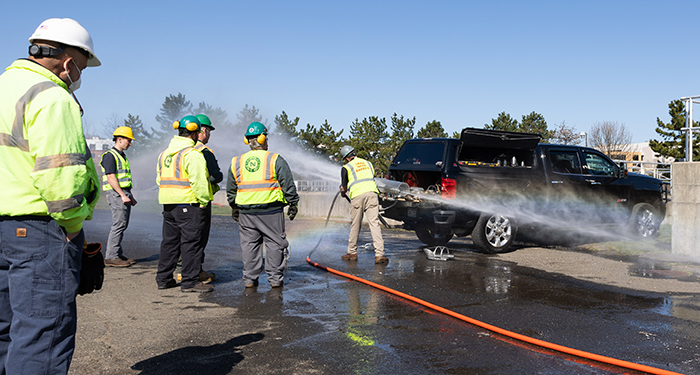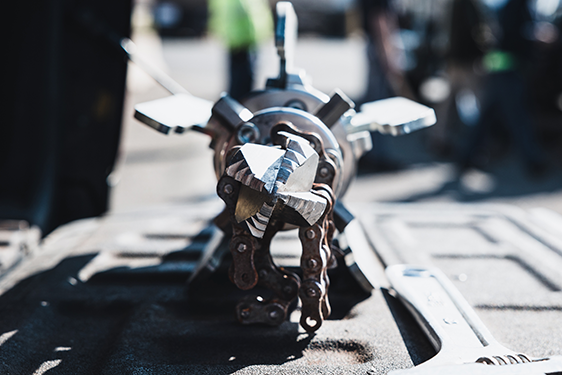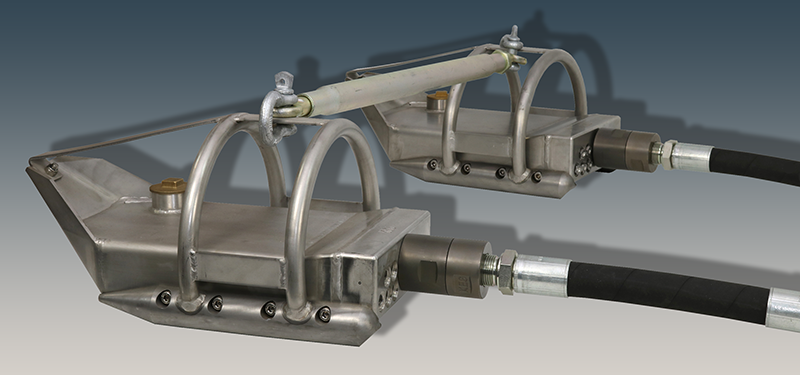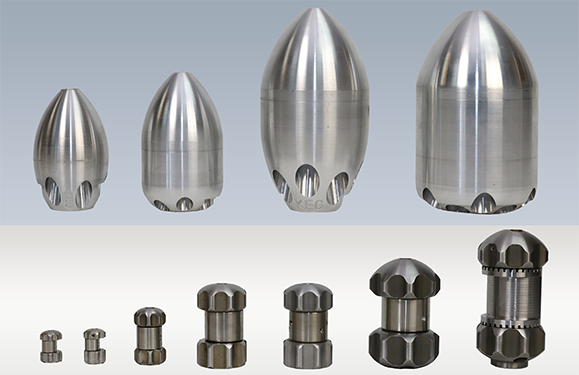
Industrial Wastewater: Eliminating pipe obstructions with hose cleaning nozzles
Mike Edwards
Features cleaning hose KEG Technologies nozzle pipes The most effective high efficiency nozzles have tight water patterns that efficiently clean the pipe floor/wall and create a powerful water stream that not only moves debris long distances but also propels the nozzle.
The most effective high efficiency nozzles have tight water patterns that efficiently clean the pipe floor/wall and create a powerful water stream that not only moves debris long distances but also propels the nozzle. Although industrial processes vary broadly, in any plant dusts, grease, slag, metals, residues, and cementitious particulates generated during manufacturing can make their way into the wastewater stream, accumulate, and even harden in underground pipelines.
As a result, plants conduct periodic maintenance to flush debris and sediment from pipes, including breaking up hardened obstructions, to prevent blockage and protect downstream wastewater treatment equipment from excessive loading.
“Many plants were built 40 to 80 years ago with most of the pipes underground, so they are old, hard to access, and can accumulate excessive, hardened debris that must be removed,” says Bill Benner, senior project manager for Ventilation Power Cleaning (VPC), a Seattle, WA-based firm that provides vacuum truck services to remove various industrial debris in the form of solids, liquids, sludges, and slurries.
“If this kind of debris is transported by pipe to onsite clarifiers, digesters, sewer vaults, or treatment plants, it can disrupt and overburden the process as it collects and hardens,” Benner adds.
“A similar problem occurs when rain washes debris in outdoor processing or storage areas into basins, ponds, or reservoirs prior to transport through pipes for further treatment.”

Chain cutter nozzles like those from KEG Technologies are designed to cut through difficult obstructions and thick root masses using high-pressure water that spins the cutting chains at high velocity.
The task of industrial pipe cleaning typically falls to third party cleaning companies like VPC, which come to facilities with a vacuum truck and perform the work periodically, unless emergency debris removal is required.
According to Benner, most wastewater pipes are typically in 300 to 500 ft lengths and 12 to 46 in. diameters. Special nozzles are used to propel a hose connected to a vacuum truck down the pipeline and back using water jets. The nozzle must supply enough force to dislodge any debris and carry it back using water pressure to be suctioned out by the vacuum truck.
“Industrial plants cannot afford production downtime, so we rely on high-performance nozzles to get the job done quickly and reliably. Using the right nozzle and technique can be the difference between cleaning out a pipe within 20 minutes or having it take hours, days, or fail completely,” says Benner.

A unique floor cleaner model called the Twins utilizes two floor cleaners with high-performance fluid mechanics that work in tandem with a Y-connector, for pipe up to 84” in diameter.
Fortunately for contractors, an assortment of high-performance hose nozzles is available to expedite the removal of any debris buildup in the pipes of facilities such as refineries, cement plants, chemical plants, steel mills, or pulp and paper mills. This can help to prevent a range of problems including regulatory fines, process disruption, and unscheduled downtime.
As known in the industry, there are tiers of nozzles rated for performance and water efficiency: Tier 1 (about 30% efficient), Tier 2 (50 to 60% efficient), and Tier 3 (75 to 98% efficient). Low-performance Tier 1 nozzles tend to use only 30% of the available energy, wasting 70% due to excessive turbulence. Tier 2 nozzles are more efficient but still inadequate for tougher jobs.
In contrast, the most effective Tier 3 nozzles have tight water patterns that efficiently clean the pipe floor/wall. In addition, the units create a powerful water stream that not only moves debris long distances but also propels the nozzle.
“We rely on the highest-efficiency Tier 3 nozzles by KEG Technologies because they provide the two most important things we need: the ability to move the hose and nozzle down the entire length of pipe to the debris location, along with the ability to push the debris out of the line with water pressure so we can remove it with the vacuum truck,” says Benner.
KEG Technologies, a manufacturer of industrial, sewer and storm lines products including Tier 1 to Tier 3 nozzles, floor cleaners, and chain cutters, works with a network of distributors and authorized resellers in Canada to cover all provinces.

KEG’s Torpedo Nozzle (top row) uses two different water jet angles to ensure superior sand, mud, and debris transport from the pipe floor in diameters from 6 to 16 in. The Duce Nozzle (bottom row) uses water driven rotation and vibration to create a unique “jackhammer” action to remove stubborn debris from pipes.
What sets the most efficient Tier 3 nozzles apart from others in the category is fluid mechanics engineering on a par with the aerodynamics of race cars or jet fighters. In the case of KEG’s Tier 3 nozzles, the high-performance fluid mechanics design leaves little room for power losses and excessive turbulence.
“We use their Tier 3 nozzles essentially everywhere we go. They have a large repertoire of high-performance nozzles that has reliably met our need in every industrial application,” says Benner. VPC originally purchased about a dozen assorted nozzles from the industrial, sewer and storm line product manufacturer.
For wastewater applications, VPC prefers floor cleaner and spinning style nozzles. As the name suggests, these nozzles travel along the floor of large diameter pipe – instead of just the center – and focus high-pressure water from hoses through an assortment of jets. The directed, high-pressure water is ideal for removing sludge, mud, compacted materials, and heavy debris (rocks, bricks, broken concrete, etc.) from industrial pipes, storm lines, and sanitary lines.
“Floor cleaner nozzles are designed to ride on the bottom third of pipe so have the most dynamic effect for removing heavy debris, sand, and rock that has accumulated there,” says Benner. For example, KEG’s Torpedo Nozzle utilizes two different water jet angles to ensure superior sand, mud, and debris transport from the pipe floor in diameters from 6-16”. The company also offers a variety of floor cleaner sizes designed for pipe diameters from 4-72”. One unique floor cleaner model, called the Twins, utilizes two floor cleaners with high-performance fluid mechanics that work in tandem with a Y-connector, for pipe up to 84” in diameter.
According to Benner, VPC also uses a unique rotating nozzle to remove stubborn debris from pipes. The Duce Nozzle utilizes water driven rotation and vibration to create a unique “jackhammer” action to remove grout and mortar residue, scaling, tuberculation, or other deposits that have hardened to the pipe floor or wall. This approach is more efficient than cutting and milling out the material but is not recommended for clay pipes.
“We have found that the KEG Technologies’ Duce Nozzle works extremely well to break up hardened debris,” he says.
When a severe blockage is identified, chain cutter nozzles are designed to cut through difficult obstructions and thick root masses. When high-pressure water enters the chain cutter nozzle chamber, it is directed to spin the cutting chains at high velocity with enough torque to avoid seizing.
Although the high-performance Tier 3 nozzles cost more than lower performing nozzles, Benner has found this acceptable because his work crew completes jobs much faster using them. He notes that there is no substitute for having the right tools and experience to clear industrial pipes quickly, whether for routine maintenance or an emergency.
“We will not use inferior nozzles because they just don’t work when industrial pipes and lines must be efficiently cleaned and cleared of any debris. This commitment to quickly getting the job done right has earned us repeat business and helped to keep plants running without incident or downtime,” says Benner.
Having used high-performance nozzles for years, he emphasizes that the units are designed to last. “We originally bought some KEG Tier 3 nozzles fifteen years ago, and they still perform reliably,” says Benner.
As a final thought Benner concludes, “You really need to understand the products you use, and KEG will go the extra mile to help you understand the product.”
This article was provided by KEG Technologies. Its Canadian office can be reached at 236-458-4477; or contact Ken Billingham at kbillingham@kegtechnologies.net.
Print this page